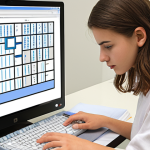Okay, let’s dive in:Time management in the Information Processing Engineer Practical Exam can feel like you’re juggling flaming torches while riding a unicycle – stressful!
From personal experience, I know the pressure can be intense. You’ve got a clock ticking down, complex problems to solve, and the fear of leaving points on the table.
But don’t fret; it’s not an insurmountable challenge. It’s about smart strategies, practice, and knowing where to focus your energy. Lately, there’s been a lot of buzz about utilizing AI-powered practice tools and mock exams to simulate the real-world test environment, helping you get a better grasp on pacing yourself.
Experts are even suggesting breaking down the exam into smaller, manageable chunks and allocating specific time slots to each section. This way, you’ll avoid getting bogged down in one area and running out of time for the rest.
Let’s get into the details further down below!
Okay, let’s get started!
Crafting a Personalized Study Timeline

Assess Your Strengths and Weaknesses
Before diving into the depths of practice problems and complex algorithms, take a good, hard look at where you stand. I remember when I first started prepping, I thought I was hot stuff with database concepts, only to realize I was woefully behind on network security. It’s humbling, but essential. Identify your strongest areas – those topics where you can practically teach the subject to a room full of people. Then, pinpoint the areas where you break out in a cold sweat just thinking about them. Be honest with yourself! Use past quizzes, mock exams, or even just a casual review of the syllabus to get a clear picture. Once you know your strengths and weaknesses, you can tailor your study schedule to dedicate more time to those challenging areas, while still keeping your strong areas sharp.
Allocate Time Based on Difficulty and Weight
Not all topics are created equal, both in terms of difficulty and how much they contribute to your final score. Some concepts might click instantly, while others require hours of head-scratching and multiple cups of coffee. Also, some sections of the exam are simply worth more points than others. With this in mind, allocate your study time accordingly. For example, if network security is a high-stakes topic for you, carve out significantly more time for it in your schedule. Conversely, if you’re a whiz at database design, you can probably get away with a shorter review period. This is about smart studying, not just hard studying. I once spent an entire week trying to perfect my understanding of a minor topic that only appeared as a single question on the exam. It was a colossal waste of time that could have been better spent mastering the more crucial concepts.
Leveraging Mock Exams for Realistic Time Simulation
Treat Mock Exams Like the Real Deal
Here’s a truth bomb: taking mock exams while casually flipping through Instagram isn’t going to do you any favors. To truly benefit from mock exams as a time management tool, you need to simulate the actual exam environment as closely as possible. That means finding a quiet place where you won’t be disturbed, setting a timer for the exact duration of the exam, and resisting the urge to Google answers. I know it’s tempting, but cheating yourself only hurts you in the long run. Treat each mock exam like a dress rehearsal for the big day. Pay attention to how you feel under pressure, where you tend to get stuck, and how much time you’re spending on each question. This will give you valuable insights into your pacing and help you identify areas where you need to improve. For me, simulating the real deal meant wearing the same outfit I planned to wear on exam day and even eating the same breakfast. Sounds silly, maybe, but it helped me get into the right mindset.
Analyze Your Performance and Adjust Your Strategy
The real magic of mock exams happens after you’ve finished them. Don’t just glance at your score and move on. Take the time to thoroughly analyze your performance. Identify which questions you got wrong, why you got them wrong, and how much time you spent on each question. Did you run out of time before you could attempt certain sections? Did you get bogged down in tricky questions and waste precious minutes? Use this information to refine your time management strategy. Maybe you need to allocate more time to certain topics, or maybe you need to develop a better strategy for skipping difficult questions and coming back to them later. The key is to learn from your mistakes and use each mock exam as an opportunity to improve. I used to keep a log of my mock exam results, noting my time spent on each section and the types of questions I consistently struggled with. It was a bit obsessive, but it helped me track my progress and identify patterns that I wouldn’t have noticed otherwise.
Mastering the Art of Question Prioritization
Identify Quick Wins and Low-Hanging Fruit
During the exam, not all questions are created equal. Some are straightforward and can be answered quickly, while others are complex and require more thought. Your goal should be to identify the “quick wins” – those questions that you can answer easily and confidently in a short amount of time. Knock these out first to build momentum and rack up points early on. This will also free up more time for the more challenging questions later on. It’s like picking the low-hanging fruit – easy to grab and provides immediate satisfaction. I remember during one practice exam, I spent almost 20 minutes stuck on a single coding problem. Frustrated, I finally decided to skip it and move on. To my surprise, the very next question was a simple multiple-choice question that I answered in seconds. That experience taught me the importance of prioritizing questions and not getting bogged down in one area.
Develop a System for Marking and Returning to Difficult Questions
No matter how well-prepared you are, you’re bound to encounter questions that stump you. Don’t panic! Instead of wasting precious time trying to force an answer, develop a system for marking these questions and returning to them later. This could be as simple as circling the question number in your test booklet or using the exam software’s built-in flagging feature. The key is to have a consistent method for quickly identifying the questions you need to revisit. When you come back to these questions, approach them with a fresh perspective. Sometimes, a short break can be all you need to see the problem in a new light. Also, by answering the easier questions first, you may have gained knowledge or insights that will help you solve the more difficult ones. I used to use a simple system of stars: one star for questions I was unsure about, two stars for questions I had no clue about. This helped me prioritize which questions to revisit first when I had extra time.
Staying Calm and Focused Under Pressure
Practice Relaxation Techniques to Manage Anxiety
The exam environment can be incredibly stressful, even for the most seasoned test-takers. Anxiety can cloud your thinking, impair your memory, and make it difficult to concentrate. That’s why it’s essential to practice relaxation techniques to manage your anxiety and stay calm under pressure. These techniques can be as simple as taking a few deep breaths, visualizing a peaceful scene, or practicing mindfulness meditation. The key is to find what works best for you and practice it regularly in the weeks leading up to the exam. This will help you develop a conditioned response, so that when you start to feel anxious during the exam, you can quickly activate your relaxation techniques and regain your focus. I used to practice a simple breathing exercise – inhaling deeply for four seconds, holding for four seconds, and exhaling slowly for six seconds. It sounds basic, but it really helped me calm my nerves during the exam.
Maintain a Positive Mindset and Believe in Yourself
Your mindset can have a profound impact on your performance. If you go into the exam feeling negative and doubtful, you’re setting yourself up for failure. Conversely, if you maintain a positive mindset and believe in yourself, you’re more likely to perform at your best. This doesn’t mean ignoring your weaknesses or pretending that the exam isn’t challenging. It simply means focusing on your strengths, reminding yourself of all the hard work you’ve put in, and trusting that you have the skills and knowledge to succeed. Before the exam, take some time to visualize yourself succeeding. Imagine yourself answering questions confidently, managing your time effectively, and feeling a sense of accomplishment when you finish. This can help boost your confidence and reduce your anxiety. I always had a mantra that I repeated to myself before every exam: “I am prepared, I am capable, and I will succeed.” It might sound cheesy, but it worked for me.
The Power of Strategic Breaks
Recognize the Signs of Mental Fatigue
Long stretches of intense concentration can lead to mental fatigue, which can significantly impair your performance. It’s important to recognize the signs of mental fatigue, such as difficulty concentrating, increased irritability, and a tendency to make careless mistakes. When you start to notice these signs, it’s time to take a break. Even a short break of just a few minutes can do wonders for your mental clarity and focus. Stepping away from the exam for a few minutes can help you clear your head and return with a fresh perspective. During my prep, I noticed that after about 90 minutes of solid studying, my brain would start to feel like it was wading through molasses. That was my cue to step away, grab a snack, and do something completely unrelated to the exam for a few minutes.
Utilize Short Breaks to Recharge and Refocus
During your breaks, it’s important to do something that helps you recharge and refocus. This could be as simple as stretching your legs, getting a drink of water, or listening to a calming piece of music. Avoid activities that are mentally taxing, such as checking your email or scrolling through social media. The goal is to give your brain a chance to rest and recover. Some people find that taking a few deep breaths or practicing mindfulness meditation can be helpful during breaks. Others prefer to engage in a physical activity, such as going for a short walk or doing some light stretches. Experiment with different techniques to find what works best for you. I found that listening to upbeat music and doing a few jumping jacks helped me shake off the mental cobwebs and return to the exam with renewed energy.
Optimizing Your Workspace and Tools
Ensure a Comfortable and Ergonomic Setup
Your physical environment can have a significant impact on your focus and concentration. Make sure your workspace is comfortable, well-lit, and free from distractions. Use an ergonomic chair and keyboard to prevent strain and fatigue. Keep your desk clutter-free and organized. A clean and organized workspace can help you stay focused and reduce stress. I remember when I first started studying for the exam, I would try to cram in study sessions wherever I could – on the couch, in bed, even at the kitchen table while my family was watching TV. It was a disaster! I was constantly distracted and uncomfortable, and my productivity suffered. Once I created a dedicated study space in a quiet corner of my house, my focus and concentration improved dramatically.
Familiarize Yourself with the Exam Software and Tools
If the exam is administered on a computer, take the time to familiarize yourself with the exam software and tools. This includes the navigation controls, the text editor, and any other features that you’ll need to use during the exam. The more comfortable you are with the software, the less time you’ll waste trying to figure out how to use it. Many exam providers offer practice exams or tutorials that allow you to get familiar with the software. Take advantage of these resources to avoid any surprises on exam day. I once took a practice exam where I spent almost 10 minutes trying to figure out how to use the text editor. It was a frustrating experience that could have been avoided if I had simply taken the time to familiarize myself with the software beforehand.
Review and Refine Your Time Management Skills
Regularly Assess Your Progress and Identify Areas for Improvement
Time management is an ongoing process, not a one-time fix. Regularly assess your progress and identify areas where you can improve. This could involve tracking your time spent on different tasks, analyzing your mock exam results, or simply reflecting on your study habits. Be honest with yourself about your strengths and weaknesses. Are you consistently running out of time on certain sections of the exam? Are you spending too much time on low-value tasks? Use this information to refine your time management skills and adjust your study schedule accordingly. I found that keeping a study journal helped me track my progress and identify patterns in my study habits. I would note how much time I spent on each topic, how well I understood the material, and any challenges I encountered. This helped me stay accountable and identify areas where I needed to focus my efforts.
Seek Feedback from Mentors or Study Partners
Getting feedback from others can be a valuable way to improve your time management skills. Ask mentors or study partners to observe your study habits and provide constructive criticism. They may be able to identify areas where you’re wasting time or offer suggestions for more effective strategies. Be open to their feedback and willing to experiment with new approaches. Sometimes, an outsider’s perspective can be exactly what you need to break through a plateau. I had a study partner who noticed that I was spending too much time trying to perfect my notes. She suggested that I focus on understanding the concepts first and worry about the notes later. It was a simple suggestion, but it helped me save a lot of time and improve my overall comprehension.
Time Management Techniques Summary
| Technique | Description | Benefits |
|---|---|---|
| Personalized Timeline | Tailor your study schedule based on strengths and weaknesses. | Efficient use of study time, focus on challenging areas. |
| Mock Exam Simulation | Simulate real exam conditions to practice time management. | Realistic assessment, identification of pacing issues. |
| Question Prioritization | Identify and answer quick win questions first. | Build momentum, maximize points early on. |
| Relaxation Techniques | Practice deep breathing or mindfulness to manage anxiety. | Stay calm and focused under pressure. |
| Strategic Breaks | Take short breaks to recharge and refocus. | Prevent mental fatigue, improve concentration. |
| Workspace Optimization | Ensure a comfortable and ergonomic study environment. | Reduce distractions, improve focus. |
| Regular Review | Assess progress and refine time management skills. | Continuous improvement, identification of weaknesses. |
In Conclusion
Mastering time management isn’t about squeezing more hours into the day; it’s about making the most of the time you have. By personalizing your study timeline, simulating exam conditions, prioritizing questions, and staying calm under pressure, you can significantly improve your performance and achieve your academic goals. Remember to regularly review and refine your strategies, and don’t be afraid to seek feedback from others. Good luck, and happy studying!
Helpful Tips to Keep in Your Back Pocket
1. Download relevant study apps that offer flashcards, quizzes, and progress tracking. Many are free or have affordable subscription options.
2. Join online study groups or forums to connect with other students and share tips and resources. A study buddy can provide motivation and support.
3. Take advantage of free resources available at your local library, such as study guides, practice exams, and quiet study spaces.
4. Invest in noise-canceling headphones to minimize distractions and create a more focused study environment.
5. Reward yourself after completing a study session or achieving a study goal. It could be as simple as watching an episode of your favorite TV show or going for a walk.
Key Takeaways
Personalize your study schedule: Tailor your plan to your strengths and weaknesses.
Simulate the real exam: Use mock exams to practice under pressure.
Prioritize questions: Focus on quick wins first.
Stay calm: Practice relaxation techniques.
Take strategic breaks: Recharge your mind for optimal focus.
Frequently Asked Questions (FAQ) 📖
Q: What’s the single biggest time-waster people encounter during the Information Processing Engineer Practical Exam, and how can I avoid it?
A: Honestly, it’s getting stuck on one problem! I’ve seen so many people (including myself, back in the day) sink precious minutes – even half an hour – into a single question.
My advice? If you’ve wrestled with something for 10-15 minutes and aren’t making headway, flag it and MOVE ON. Seriously.
Come back to it later with fresh eyes. Leaving it unsolved could cost you some points, but leaving multiple sections untouched because you were hyper-focused on one problem is a guaranteed fail.
Think of it like managing your investment portfolio: diversify your effort to maximize your overall return.
Q: Are there any specific topics within the Information Processing Engineer Practical Exam where time management is especially critical?
A: Absolutely. Data structures and algorithms are notorious time-sinks. I remember spending an embarrassing amount of time trying to optimize a sorting algorithm during a practice exam, only to realize I was overcomplicating things.
Focus on mastering the fundamental concepts and common problem-solving techniques. Don’t try to reinvent the wheel. If you see a data structure question, quickly identify the most efficient approach (e.g., hash table for lookups, priority queue for scheduling) and implement it directly.
Also, database design questions can be tricky – make sure you understand normalization principles and how to design efficient queries. You can’t afford to spend an hour agonizing over the perfect database schema.
Q: Besides practicing with mock exams, what other strategies can I use to improve my time management skills for this exam?
A: Beyond just practice tests, try this: simulate exam conditions during your study sessions. Let’s say you’re studying database theory. Instead of leisurely reading the textbook for three hours, set a timer for 45 minutes and force yourself to solve practice problems under time pressure.
Treat it like a mini-exam. This helps you build speed and accuracy simultaneously. Another tip: Learn to recognize “easy wins.” Some problems are designed to be relatively straightforward and quick to solve.
Identifying and tackling these first can give you a confidence boost and free up more time for the tougher challenges. Finally, don’t neglect your physical and mental well-being.
Get enough sleep, eat healthy, and take breaks during your study sessions. A well-rested brain performs much better under pressure. Trust me, burning the midnight oil for weeks on end is a recipe for disaster.
📚 References
Wikipedia Encyclopedia
구글 검색 결과
구글 검색 결과
구글 검색 결과
구글 검색 결과
구글 검색 결과






